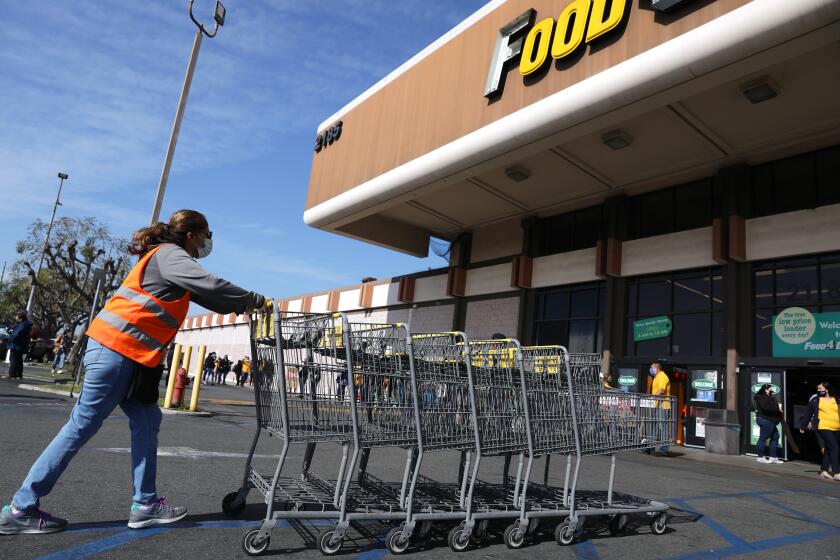Southern California grocery workers prepare for a strike: ‘We’ve walked through hell’

Grocery workers across Southern California began voting Monday on whether to authorize a strike against Ralphs, Albertsons, Vons and Pavilions in an effort to pressure the companies to raise wages.
More than 47,000 workers at 500 stores are eligible to vote over five days, with the result expected to be announced Sunday.
A three-year contract between the United Food and Commercial Workers and Kroger, the parent company of Ralphs, and Albertsons, which owns Vons and Pavilions, expired March 6.
Talks between the union’s seven locals and the companies stalled two weeks ago. A strike authorization vote does not necessarily result in a strike. It gives union leaders the right to call a strike if an agreement cannot be reached.
Intense negotiations had taken place since January, “proceeding at a regular rhythm,” said John Grant, president of UFCW Local 770. “Then two weeks ago it came to a screeching halt. I believe the companies wanted to see if workers are going to stand up and ask for the contract they deserve.”
More than 500 Google workers are backing a colleague who alleges the tech giant retaliated against her by ordering her to move to another continent.
Grocery workers have suffered during the pandemic, he said. “I have never seen such militancy. It’s like we’ve walked through hell and can’t stop now.”
This month, the union filed complaints of unfair labor practices with the National Labor Relations Board accusing the companies of illegal intimidation, including videotaping of workers at rallies and when they presented petitions to managers. The companies gave employees a one-time $100 bonus, which the union called a “bribe” to influence the negotiations, and they failed to provide necessary information for negotiations, according to the filings with the NLRB.
This week’s vote is aimed at calling an unfair labor practice strike. Unlike a strike over economic issues, it gives the union the right under labor law to target walkouts to selected stores, rather than have its full workforce on strike.
Kelli McGannon, a Kroger spokeswoman, said negotiations are slated to resume the week of March 28. The unfair labor practice charges “are nothing more than trumped-up charges intended to create confusion. Ralphs has and will continue to follow the law,” she said in an email.
In a statement, Ralphs said the vote creates “unnecessary concern for our associates and communities, at a time when we should be coming together in good-faith bargaining to find solutions and compromise. At Ralphs, we remain focused on settling a deal with the UFCW.”
Ralphs is already hiring temporary workers for all locations, said John Votava, corporate affairs director. “Since the UFCW is threatening disruption... we need to move forward with contingency planning,” he said in an email.
In an email, Albertsons spokeswoman Melissa Hill said the company’s goal is “to provide our employees with a competitive total compensation package of wages, health, welfare and pension benefits. We are committed to working collaboratively.”
Workers for Kroger, which owns grocery chains such as Ralphs and Food 4 Less, struggle to meet basic needs, according to a survey commissioned by a union representing them in negotiations.
The companies are offering the highest tier of grocery workers — full-time checkers with five years of experience who make $22.50 an hour — a 60-cent annual increase over three years.
However, nearly three-quarters of grocery workers at the stores are part time, Grant said, as companies have cut back full-time schedules over the years.
Grant called the proposed wage hike “paltry,” especially given high inflation, and far less than the companies recently agreed to in Oregon and Colorado. The union proposes a raise of $2 the first year of the contract for the highest-paid workers, $1.50 in the second year and $1.50 in the third year, with larger increases for lower-wage workers.
A judge has ordered the luxury resort Terranea to pay $3.3 million in fines for failing to first rehire the workers it laid off during the pandemic.
More to Read
Inside the business of entertainment
The Wide Shot brings you news, analysis and insights on everything from streaming wars to production — and what it all means for the future.
You may occasionally receive promotional content from the Los Angeles Times.













